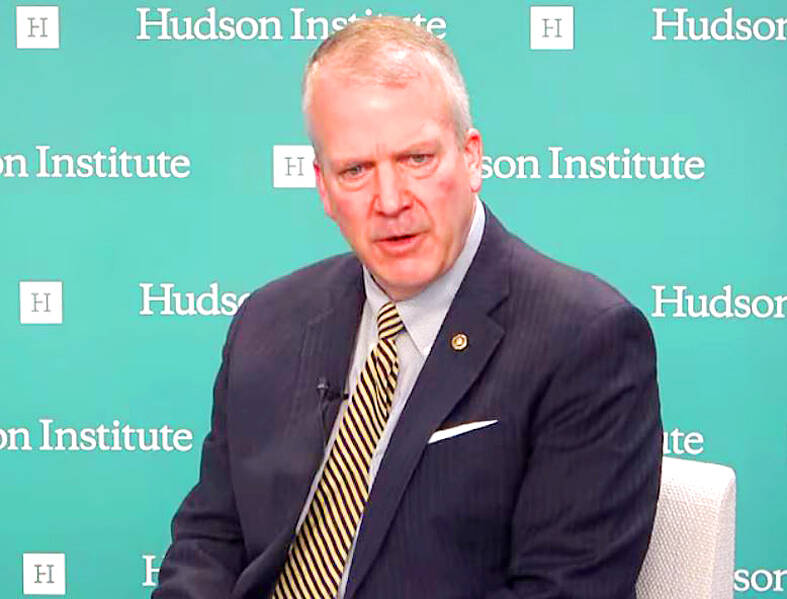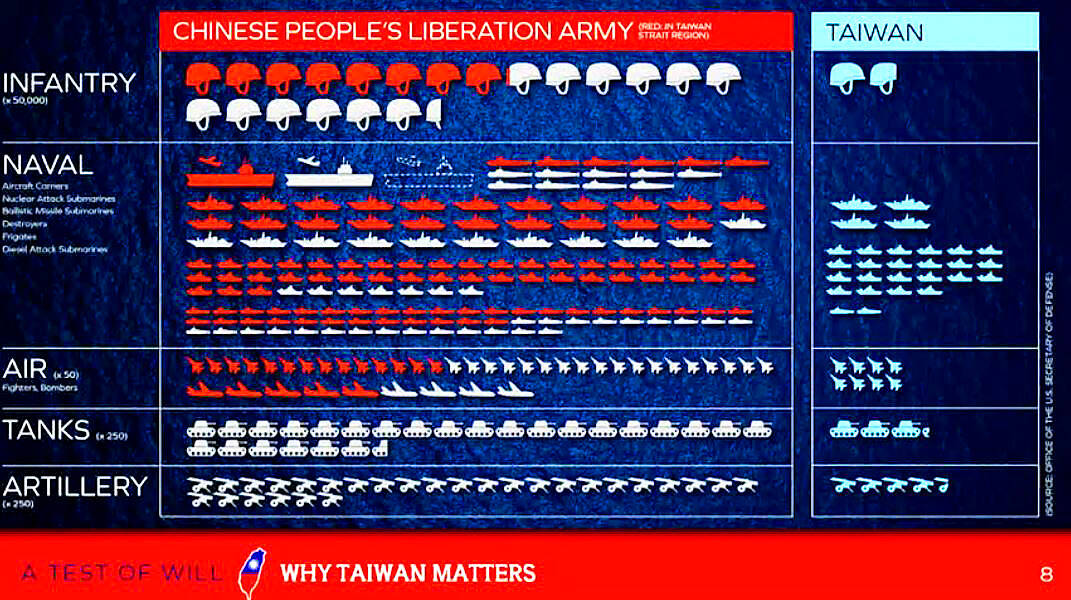US Senator Dan Sullivan on Thursday called for allies to learn from the US and introduce bills to deter China, as a possible unification of China and Taiwan could result in mass global economic loss.
The world could face up to US$2.5 trillion in economic losses, as per a US Department of State estimate, if China took over Taiwan’s semiconductor industry, which produces about 92 percent of the world’s high-end chips, Sullivan said in a speech at the Washington-based Hudson Institute.
In a speech titled “A Test of Will: Why Taiwan Matters,” Sullivan said that possible global economic impact was the impetus behind his introduction in the US Senate in January last year of the Sanctions Targeting Aggressors of Neighboring Democracies with Taiwan Act, which compels a sitting US president to impose economic and financial sanctions on China within three days of an invasion of Taiwan.

Photo: screen grab from a Hudson Institute livestream
“One of the things that we’ve learned from the brutal invasion of Ukraine by Russia is that comprehensive economic and financial sanctions have the best chance of deterring a conflict when they’re clearly defined and ready to go before the conflict begins,” Sullivan said.
“I have been working with my colleagues on both sides of the aisle to get this passed,” he added.
While on congressional member delegation visits “around the world, in Germany, at Munich, in Brussels, in London, in [South] Korea, in Japan, I’ve been pitching our allies to do the same,” Sullivan said.

Photo: screen grab from a Hudson Institute livestream
By doing the same, the US’ key allies, which account for up to 70 percent of the world’s GDP, would send a message to Chinese President Xi Jinping (習近平): “If you do it, here’s what you’re going to get,” he said.
Sullivan added that similar legislation could have a huge deterrent effect on a potential Chinese military invasion of Taiwan.
Meanwhile, US Assistant Secretary of Defense for Indo-Pacific Security Affairs Ely Ratner on Thursday said that Washington is strengthening its ability to deter China from invading Taiwan before the end of the decade.
“It’s going to be really hard, but I think we’re getting after it with urgency, but also with confidence, that we can do it,” Ratner said during a discussion on Indo-Pacific security hosted by the institute.
The high cost of an invasion of Taiwan would simply dissuade China, he said.
“What we’re doing is reinforcing that deterrence, ensuring that the costs of aggression remain unacceptably high to Beijing,” he said.
China “is the only country with the capability and intent to overthrow the international order,” in a way that “runs directly counter to vital US national interests,” Ratner said.
“We see that manifested in a challenge to the order in the Indo-Pacific, the rules of the road, the institutions, the norms, the efforts to undermine US alliances and partnerships,” he said.
The Chinese People’s Liberation Army has been “dangerously” intercepting aircraft of the US, its allies and partners as they engage in “lawful activity” in the region’s international airspace, Ratner said.
Ratner said the US is working with its allies and partners to ensure that Beijing’s coercion and aggression do not succeed.
“Deterrence is real, deterrence is strong, and we’re doing everything we can to make sure it stays that way tomorrow and into the future,” he said.

FREEDOM OF NAVIGATION: The UK would continue to reinforce ties with Taiwan ‘in a wide range of areas’ as a part of a ‘strong unofficial relationship,’ a paper said The UK plans to conduct more freedom of navigation operations in the Taiwan Strait and the South China Sea, British Secretary of State for Foreign, Commonwealth and Development Affairs David Lammy told the British House of Commons on Tuesday. British Member of Parliament Desmond Swayne said that the Royal Navy’s HMS Spey had passed through the Taiwan Strait “in pursuit of vital international freedom of navigation in the South China Sea.” Swayne asked Lammy whether he agreed that it was “proper and lawful” to do so, and if the UK would continue to carry out similar operations. Lammy replied “yes” to both questions. The

SECOND SPEECH: All political parties should work together to defend democracy, protect Taiwan and resist the CCP, despite their differences, the president said President William Lai (賴清德) yesterday discussed how pro-Taiwan and pro-Republic of China (ROC) groups can agree to maintain solidarity on the issue of protecting Taiwan and resisting the Chinese Communist Party (CCP). The talk, delivered last night at Taoyuan’s Hakka Youth Association, was the second in a series of 10 that Lai is scheduled to give across Taiwan. Citing Taiwanese democracy pioneer Chiang Wei-shui’s (蔣渭水) slogan that solidarity brings strength, Lai said it was a call for political parties to find consensus amid disagreements on behalf of bettering the nation. All political parties should work together to defend democracy, protect Taiwan and resist

By refusing to agree spending increases to appease US President Donald Trump, Spanish Prime Minister Pedro Sanchez threatened to derail a summit that NATO Secretary-General Mark Rutte needs to run smoothly for the sake of the military alliance’s future survival. Ahead of yesterday’s gathering in The Hague, Netherlands, things were going off the rails. European officials have expressed irritation at the spoiler role that Sanchez is playing when their No. 1 task is to line up behind a pledge to raise defense spending to 5 percent of GDP. Rutte needed to keep Spain in line while preventing others such as Slovakia

SHIFT PRIORITIES: The US should first help Taiwan respond to actions China is already taking, instead of focusing too heavily on deterring a large-scale invasion, an expert said US Air Force leaders on Thursday voiced concerns about the Chinese People’s Liberation Army’s (PLA) missile capabilities and its development of a “kill web,” and said that the US Department of Defense’s budget request for next year prioritizes bolstering defenses in the Indo-Pacific region due to the increasing threat posed by China. US experts said that a full-scale Chinese invasion of Taiwan is risky and unlikely, with Beijing more likely to pursue coercive tactics such as political warfare or blockades to achieve its goals. Senior air force and US Space Force leaders, including US Secretary of the Air Force Troy Meink and